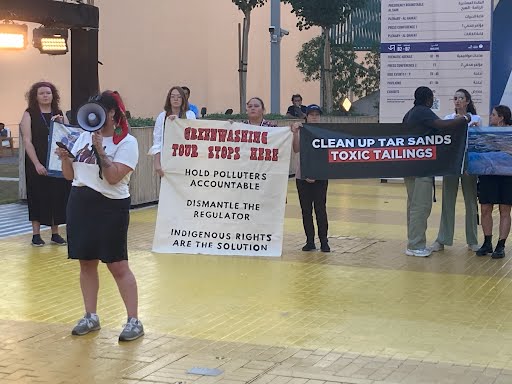Dubai, United Arab Emirates
Reducing carbon emissions is the theme at the UN Climate Summit this week, so it’s Déjà vu all over again from past summits, as baseball Hall of Fame catcher Yogi Berra famously said. But the underlying, more sinister theme to reduce emissions worldwide is tantamount to modern-day colonialism.
I made this colonialism point today during a Q&A session at a panel entitled Democratizing Access to Climate Information held in the conference “Green Zone.” Specifically, I asked why deny the ability of developing nations to prosper economically using abundant fossil fuel resources? The example of this prosperity was the very location of COP28, the United Arab Emirates, fueled by an oil and gas economy.
The response to my concerns by Alice Aedy, co-founder and CEO of Earthrise Studio, was all too glibly familiar: “developing countries absolutely should be aided in this [energy] transition and that’s where ‘just transition’ comes from.”
As I reported earlier this week, forcing developing nations in Africa, Asia, and Central and South America to “leapfrog” renewable energy by limiting access to fossil fuels ultimately comes back to impeding their ability to prosper economically.
As of 2020, the UAE’s per capital income was more than $35,500, according to the World Bank, which it places the nation in the top 20, and exceeds Canada and the average among the nations of the European

CFACT president Craig Rucker speaking to Mariam al-Mheiri, Minister of Climate Change and Environment for the United Arab Emirates, today at the UN Climate Summit.
Union. In numerous countries that comprise the developing world, per capita income levels are less than one-tenth of UAE’s income, from Rwanda ($638) to Cambodia ($1,346) to El Salvador ($3,128). Wind turbines and solar panels will not put these nations anywhere near the income levels of UAE or the lower-income European nations.
The new colonialism to force climate change conformity on developing countries is all too evident in the world envisioned by COP28. The Financial Times just reported that there is a “looming land grab” in Africa by Western corporations to purchase land in Liberia, Zimbabwe, Kenya, Tanzania, and Zambia for “carbon credits,” which is a colossal ruse. “The [methods] of exploitation might be new but the consequences are not so different to the last 200 years of land grabs in Liberia,” the Times wrote.
When land throughout Africa is locked up for “carbon credits,” for outside interests, this land becomes off-limits for — you guessed it — fossil fuel extraction to improve the nation’s economy and living standards, as it did for western nations.
This week The Federalist reminded us that economic growth in the developing world was a deep concern for Barack Obama when he was president, not because there wasn’t enough, but that there could be too much: “If everybody is raising living standards to the point where everybody has got a car and everybody has got air conditioning, and everybody has got a big house, well, the planet will boil over – unless we find new ways of producing energy,” then-President Obama said in 2013 during a trip to South Africa. This from a man who now owns three mansions and is purported to despise Britain and other European nations for their colonial past.
Which brings us back to the issue at hand – money. It is always about the money and it is going to take lots of it from Western nations primarily to somehow finance an alternative energy experiments and projects throughout the world to usher the “just transition” mentioned above.
Based on this lack of realism and financial unwillingness, I sensed today a subtle panic from the UN climate hierarchy in the person UN Executive Secretary, Simon Stiell, who spoke to the media about what he portrays as the urgency at hand. “We” — meaning rich Western nations — need “to deliver our promise to fund climate action across the world…good intentions won’t halve emissions this decade.”
He went onto to say that negotiating written agreements is “a grab bag of wish lists and heavy on posturing” and that “we need COP to deliver a bullet train to speed up climate action. We currently have an old caboose chugging over rickety tracks.”
A reminder: this is the 28th UN climate summit, and its efforts effectively amount to, as described by Secretary Stiell, “an old caboose chugging over rickety tracks.”
He knows the money isn’t there globally for “transitioning” to alternative energies on any mass scale anytime soon. Thus, he sounded the alarm today, like a broken record.
Expect climate colonialism to continue under the fiction of existential climate change from carbon emissions until enough countries break free and act in the economic interests of their own populations. Meanwhile, climate will go on changing, as it always has, in directions uncertain, regardless of how many UN officials hit the panic button.
